七年级英语下学期复习unit3
- 格式:ppt
- 大小:445.00 KB
- 文档页数:9
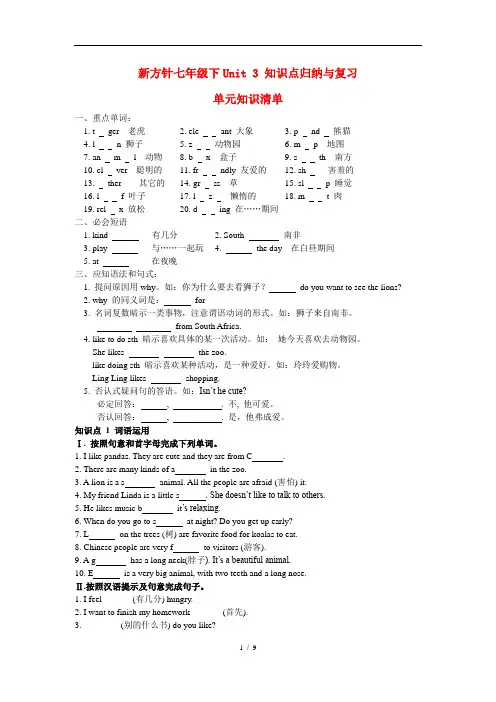
新方针七年级下Unit 3 知识点归纳与复习单元知识清单一、重点单词:1. t ger 老虎2. ele ant 大象3. p nd 熊猫4. l n 狮子5. z 动物园6. m p 地图7. an m l 动物8. b x 盒子9. s th 南方10. cl ver 聪明的11. fr ndly 友爱的12. sh 害羞的13. ther 其它的14. gr ss 草15. sl p 睡觉16. l f 叶子17. l z 懒惰的18. m t 肉19. rel x 放松20. d ing 在……期间二、必会短语1. kind 有几分2. South 南非3. play 与……一起玩4. the day 在白昼期间5. at 在夜晚三、应知语法和句式:1. 提问原因用why。
如:你为什么要去看狮子?do you want to see the lions?2. why 的同义词是:for3. 名词复数暗示一类事物,注意谓语动词的形式。
如:狮子来自南非。
from South Africa.4. like to do sth 暗示喜欢具体的某一次活动。
如:她今天喜欢去动物园。
She likes the zoo.like doing sth 暗示喜欢某种活动,是一种爱好。
如:玲玲爱购物。
Ling Ling likes shopping.5. 否认式疑问句的答语。
如:Isn’t he cute?必定回答:, . 不, 他可爱。
否认回答:, . 是,他弗成爱。
知识点1 词语运用Ⅰ. 按照句意和首字母完成下列单词。
1. I like pandas. They are cute and they are from C .2. There are many kinds of a in the zoo.3. A lion is a s animal. All the people are afraid (害怕) it.4. My friend Linda is a little s . She doesn’t like to talk to others.5. He likes music b it’s relaxing.6. When do you go to s at night? Do you get up early?7. L on the trees (树) are favorite food for koalas to eat.8. Chinese people are very f to visitors (游客).9. A g has a long neck(脖子). It’s a beautiful animal.10. E is a very big animal, with two teeth and a long nose.Ⅱ.按照汉语提示及句意完成句子。
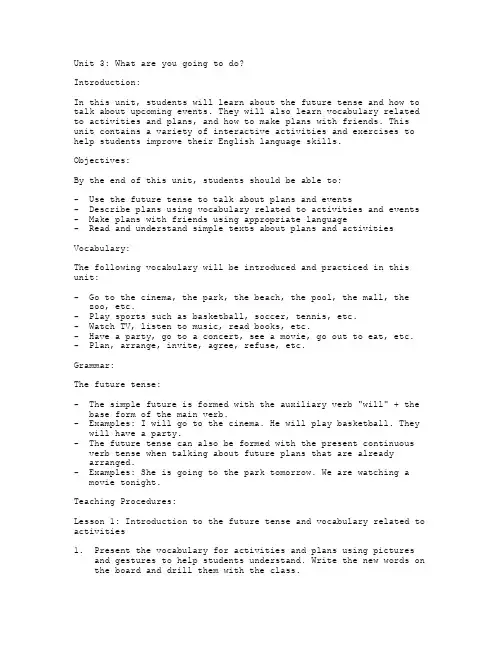
Unit 3: What are you going to do?Introduction:In this unit, students will learn about the future tense and how to talk about upcoming events. They will also learn vocabulary related to activities and plans, and how to make plans with friends. This unit contains a variety of interactive activities and exercises to help students improve their English language skills.Objectives:By the end of this unit, students should be able to:-Use the future tense to talk about plans and events-Describe plans using vocabulary related to activities and events -Make plans with friends using appropriate language-Read and understand simple texts about plans and activities Vocabulary:The following vocabulary will be introduced and practiced in this unit:-Go to the cinema, the park, the beach, the pool, the mall, the zoo, etc.-Play sports such as basketball, soccer, tennis, etc.-Watch TV, listen to music, read books, etc.-Have a party, go to a concert, see a movie, go out to eat, etc.-Plan, arrange, invite, agree, refuse, etc.Grammar:The future tense:-The simple future is formed with the auxiliary verb "will" + the base form of the main verb.-Examples: I will go to the cinema. He will play basketball. They will have a party.-The future tense can also be formed with the present continuous verb tense when talking about future plans that are alreadyarranged.-Examples: She is going to the park tomorrow. We are watching a movie tonight.Teaching Procedures:Lesson 1: Introduction to the future tense and vocabulary related to activities1.Present the vocabulary for activities and plans using picturesand gestures to help students understand. Write the new words on the board and drill them with the class.2.Introduce the future tense using "will" + the base form of themain verb. Write some simple sentences on the board using thefuture tense, and ask the students to identify the verb tense. 3.Practice the future tense by having students ask and answerquestions about their plans for the weekend. For example:-What are you going to do this weekend?-I am going to play basketball with my friends.Lesson 2: Making plans with friends1.Introduce vocabulary related to making plans with friends, suchas plan, arrange, invite, agree, and refuse. Write the new words on the board and drill them with the class.2.Model a conversation between two students making plans to go tothe cinema. Use the new vocabulary and future tense todemonstrate how to make plans with friends. For example:-A: Do you want to go to the cinema on Saturday?-B: Sure, that sounds like fun. What movie do you want to see?3. Have students work in pairs to make plans using the newvocabulary and future tense. Monitor and assist as needed.Lesson 3: Reading and writing about plans1.Have students read a short text about a friend's plans for theweekend. Ask comprehension questions to check understanding.2.Have students practice writing about their own plans for thefuture using the future tense and vocabulary related toactivities. For example:-I am going to have a party next month.-We are planning to go to the beach next weekend.Lesson 4: Review and assessment1.Review the vocabulary and grammar introduced in this unit usinga game or activity. For example, have students play a matchinggame where they match the vocabulary word to the picture.2.Assess students' understanding of the unit content using awriting prompt or quiz. For example, have students write aparagraph about their plans for the future using the futuretense and vocabulary related to activities.Conclusion:In this unit, students learn how to talk about plans and eventsusing the future tense and vocabulary related to activities. They also learn how to make plans with friends and read and write aboutplans. Through a variety of interactive activities and exercises, students improve their English language skills and gain confidence in their ability to communicate in English.。
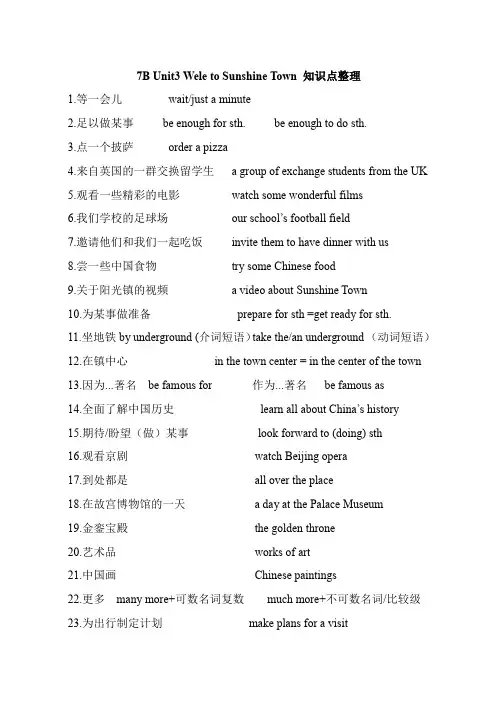
7B Unit3 Wele to Sunshine Town 知识点整理1.等一会儿wait/just a minute2.足以做某事be enough for sth. be enough to do sth.3.点一个披萨order a pizza4.来自英国的一群交换留学生 a group of exchange students from the UK5.观看一些精彩的电影watch some wonderful films6.我们学校的足球场our school’s football field7.邀请他们和我们一起吃饭invite them to have dinner with us8.尝一些中国食物try some Chinese food9.关于阳光镇的视频 a video about Sunshine Town10.为某事做准备prepare for sth =get ready for sth.11.坐地铁by underground (介词短语)take the/an underground (动词短语)12.在镇中心in the town center = in the center of the town13.因为...著名be famous for 作为...著名be famous as14.全面了解中国历史learn all about China’s history15.期待/盼望(做)某事look forward to (doing) sth16.观看京剧watch Beijing opera17.到处都是all over the place18.在故宫博物馆的一天 a day at the Palace Museum19.金銮宝殿the golden throne20.艺术品works of art21.中国画Chinese paintings22.更多many more+可数名词复数much more+不可数名词/比较级23.为出行制定计划make plans for a visit24.在湖面上划船row a boat on the lake25.在农场on a farm26.互相了解know each other27.享受某人的生活enjoy one’s life28.hear/see.watch/feel/notice sb. do sth. 经常性,反复性;整个过程hear/see.watch/feel/notice sb. doing sth. 正在进行29.我的一个老朋友要来看我。
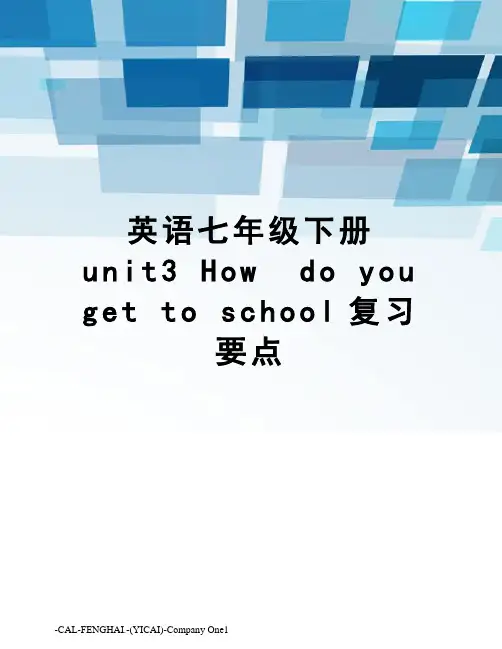
英语七年级下册u n i t3H o w d o y o u g e t t o s c h o o l复习要点-CAL-FENGHAI.-(YICAI)-Company One1Unit 3 How do you get to school?一、本单元短语总结1.get to school 到校2.take the subway 乘地铁3.take the train 坐火车4.leave for 到……地方去,离开去某地5.take…to…把……带到…去6. most students 大多数学生7. from…to…从……到…… 8.think of 想到,想起9.ride bikes 骑自行车 10.in other parts of the world 在世界的其他地方11. how far 多远 (路程、距离) 12.how long多长(时间)13.take the train to school 乘火车去上学 14.in places 在一些地方15.go to school by boat乘船去上学 16.on the school bus乘坐校车17.be different from和……不同 18.one 11-year old boy 一个十一岁大的男孩重点句子1.你怎么去上学我每天骑自行车How do you get to school , I ride my bike to school every day ,2.A:Tom每天怎么上学How does Tom go to school3.B:他通常乘公交车上学He usually goes to school by busA要花费他多少时间 How long does it take him to get to school ,B: 要花费半个小时 It takes him about half an hour.4.从你家到学校多远?仅仅大约两公里How far is it from your home to school , It's about two kilometers5.从我家到学校骑自行车大约十五分钟,It's about five minutes from my home school by bike.5.祝你在学校度过愉快的一天Have a good day at school ,6.你的朋友们乘公交车上学吗(两种说法)Do your friends go to school by bus /Do your friends take a bus to school ,7.你的朋友们骑自行车去上学吗(两种说法)Do your friends go to school by bike//Do your friends ride their bike to school8.他到学校需要半小时,He needs half an hour to get to school,9.他住的离学校大约五公里,He lives about five kilometers from school,10.他的爸爸开车去上班(两种说法)Does his father goes to work by car// Does his father drive his car to work,11.Mary想知道Bob住在哪里 Mary was know where bob lives ,12.我想知道他对数学的看法,I want to know what he thinks of math.13.我喜欢和同学们一起玩, I like to play with my classmates , ,14. 你认为旅行怎么样? What do you think of the trip15.. 对我们来说上学很容易,但是对小村庄里的孩子们来说很困难.It's easy for us to go school but ,but for the children in small village, it's difficult .16.. 在两座山之间有一条河. There is a real between the two mountains17.河上没有桥,而且河流对船来说太湍急.There is no bridge over the river and the river runs fast for boats.18.. 这些学生乘索道穿过河流去上学.These students go on a rope way to cross the river to school ,19. 他是一个11岁的男孩. She is an eleven- year -old boy ,20. 她不怕穿过两座山去上学。

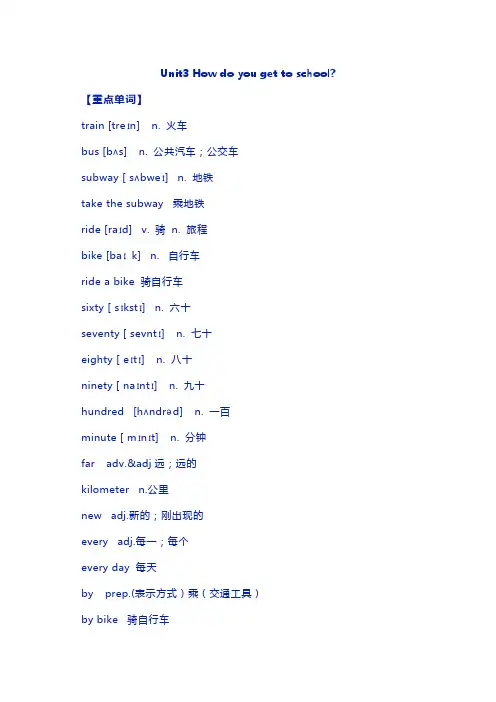
Unit3 How do you get to school?【重点单词】train [treɪn] n. 火车bus [bʌs] n. 公共汽车;公交车subway [ sʌbweɪ] n. 地铁take the subway 乘地铁ride [raɪd] v. 骑n. 旅程bike [baɪk] n. 自行车ride a bike 骑自行车sixty [ sɪkstɪ] n. 六十seventy [ sevntɪ] n. 七十eighty [ eɪtɪ] n. 八十ninety [ naɪntɪ] n. 九十hundred [hʌndrəd] n. 一百minute [ mɪnɪt] n. 分钟far adv.&adj远;远的kilometer n.公里new adj.新的;刚出现的every adj.每一;每个every day 每天by prep.(表示方式)乘(交通工具)by bike 骑自行车drive v.开车car n.小汽车;轿车live v.居住;生活stop n.车站;停止think of 认为cross v.横过;越过river n.河;江many adj.&pron.许多village n.村庄;村镇between prep.介于…之间between…and…在……和……之间bridge n.桥boat n.小船Ropeway n.索道year n.年;岁afraid adj.害怕;惧怕like prep.像;怎么样leave v.离开dream n.梦想;睡梦v.做梦true adj.真的;符合事实的come true 实现;成为现实【重点短语】1. get to school 到达学校2. take the train 乘火车3. take the subway 乘地铁4. ride a bike 骑自行车5. how do you get to school 怎么到达学校6. one hundred and five 1057. how far 多远8. how long 多长时间9. it takes sb some time to do sth 它花费某人多长时间做某事10. ride the bike to school 骑自行车到学校11. walk to , drive to ,fly to…步行去…;开车去…;坐飞机去….12. every day 每天13. I’m not sure 我不敢确信14. about= around 大约15. 10 kilometers 十公里16. good exercise 好的锻炼17. drive his car to work 开车去上班18. in his father’s car 坐父亲的车19. need about 10 minutes to get to school 需要十分钟的时间到达学校20. what do you think of…=how do you like…你觉得怎么样21. cross the river 过河22. It is easy to get to school. 到达学校很容易。
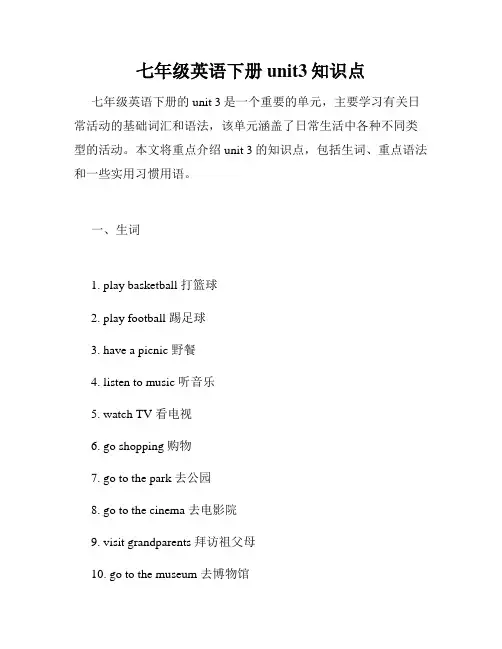
七年级英语下册unit3知识点七年级英语下册的unit 3是一个重要的单元,主要学习有关日常活动的基础词汇和语法,该单元涵盖了日常生活中各种不同类型的活动。
本文将重点介绍unit 3的知识点,包括生词、重点语法和一些实用习惯用语。
一、生词1. play basketball 打篮球2. play football 踢足球3. have a picnic 野餐4. listen to music 听音乐5. watch TV 看电视6. go shopping 购物7. go to the park 去公园8. go to the cinema 去电影院9. visit grandparents 拜访祖父母10. go to the museum 去博物馆二、重点语法本单元的语法主要涉及一些基础的动词时态和句子结构。
以下是一些重点语法:1. 一般现在时一般现在时表示经常性或习惯性的动作或状态。
它的构成是在动词原形后加-s或-es。
例如:I play football every Saturday.(我每个星期六都会踢足球。
)She goes to the supermarket twice a week.(她每周去两次超市。
)2. 一般过去时一般过去时表示在过去某个时间发生的动作或状态。
它的构成是在动词原形后加-ed。
例如:Last week, I watched a movie with my friends.(上个星期,我和我的朋友们看电影了。
)Yesterday, he visited his grandparents in the countryside.(昨天,他去乡下看望他的祖父母。
)3. 现在进行时现在进行时表示现在正在发生的动作。
它的构成是be动词(am/is/are)加上动词+ing的形式。
例如:I am listening to music now.(我现在在听音乐。
)She is watching TV in the living room.(她正在客厅看电视。
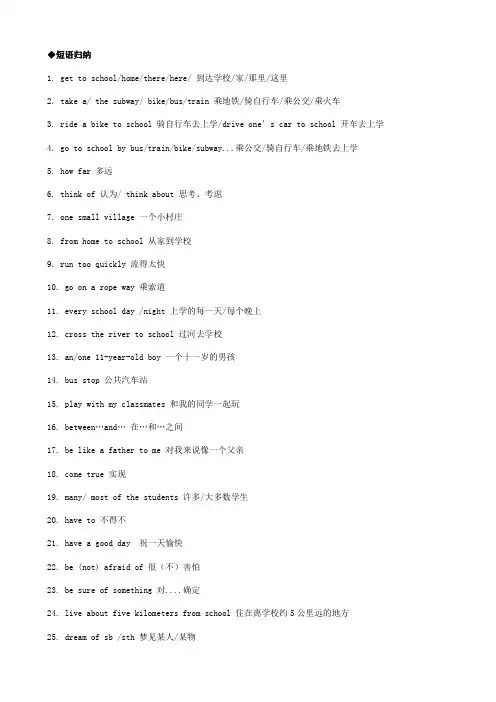
◆短语归纳1. get to school/home/there/here/ 到达学校/家/那里/这里2. take a/ the subway/ bike/bus/train 乘地铁/骑自行车/乘公交/乘火车3. ride a bike to school 骑自行车去上学/drive one’s car to school 开车去上学4. go to school by bus/train/bike/subway...乘公交/骑自行车/乘地铁去上学5. how far 多远6. think of 认为/ think about 思考、考虑7. one small village 一个小村庄8. from home to school 从家到学校9. run too quickly 流得太快10. go on a rope way 乘索道11. every school day /night 上学的每一天/每个晚上12. cross the river to school 过河去学校13. an/one 11-year-old boy 一个十一岁的男孩14. bus stop 公共汽车站15. play with my classmates 和我的同学一起玩16. between…and… 在…和…之间17. be like a father to me 对我来说像一个父亲18. come true 实现19. many/ most of the students 许多/大多数学生20. have to 不得不21. have a good day 祝一天愉快22. be (not) afraid of 很(不)害怕23. be sure of something 对....确定24. live about five kilometers from school 住在离学校约5公里远的地方25. dream of sb /sth 梦见某人/某物26. pen pal 笔友◆用法集萃1. take…to…= go to…by… 乘…去…2. How do/does sb get to…? 某人是怎样到…的?3. How far is it from…to…? 从…到…有多远?4. It takes sb. some time to do sth. 做某事花费某人多长时间。
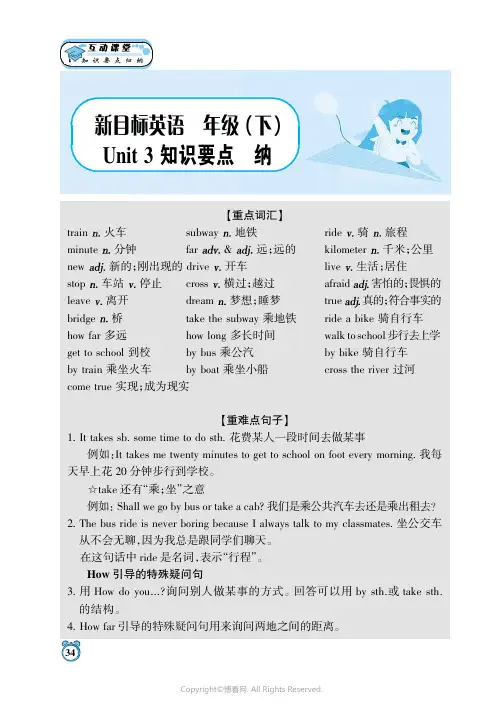
知【重点词汇】train火车subway 地铁ride 骑旅程minute 分钟far &远;远的kilometer千米;公里new 新的;刚出现的drive 开车live 生活;居住stop 车站停止cross 横过;越过afraid 害怕的;畏惧的leave 离开dream 梦想;睡梦true 真的;符合事实的bridge 桥take the subway 乘地铁ride a bike 骑自行车how far 多远how long 多长时间walk to school 步行去上学get to school 到校by bus 乘公汽by bike 骑自行车by train 乘坐火车by boat 乘坐小船cross the river 过河come true 实现;成为现实【重难点句子】1.It takes sb.some time to do sth.花费某人一段时间去做某事例如:It takes me twenty minutes to get to school on foot every morning.我每天早上花20分钟步行到学校。
☆take 还有“乘;坐”之意例如:Shall we go by bus or take a cab?我们是乘公共汽车去还是乘出租去?2.The bus ride is never boring because I always talk to my classmates.坐公交车从不会无聊,因为我总是跟同学们聊天。
在这句话中ride 是名词,表示“行程”。
How 引导的特殊疑问句3.用How do you...?询问别人做某事的方式。
回答可以用by sth.或take sth.的结构。
4.How far 引导的特殊疑问句用来询问两地之间的距离。
34Copyright ©博看网. All Rights Reserved.。
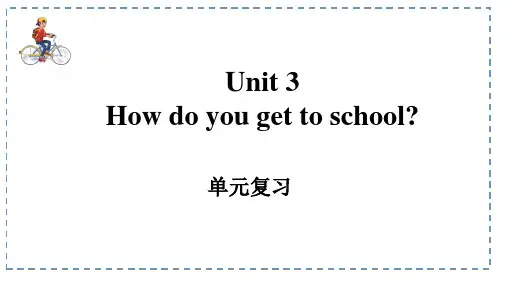
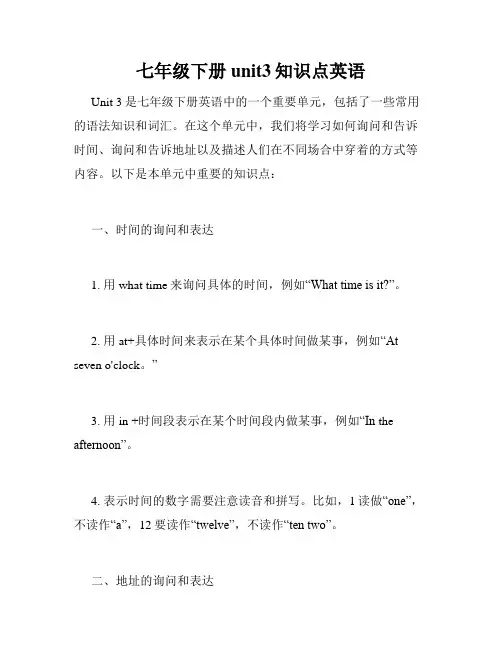
七年级下册unit3知识点英语Unit 3是七年级下册英语中的一个重要单元,包括了一些常用的语法知识和词汇。
在这个单元中,我们将学习如何询问和告诉时间、询问和告诉地址以及描述人们在不同场合中穿着的方式等内容。
以下是本单元中重要的知识点:一、时间的询问和表达1. 用what time来询问具体的时间,例如“What time is it?”。
2. 用at+具体时间来表示在某个具体时间做某事,例如“At seven o'clock。
”3. 用in +时间段表示在某个时间段内做某事,例如“In the afternoon”。
4. 表示时间的数字需要注意读音和拼写。
比如,1读做“one”,不读作“a”,12要读作“twelve”,不读作“ten two”。
二、地址的询问和表达1. 询问地址时,可以用What's your address?来问“你的地址是什么?”。
如果有上下文,也可以用Where do you live?来问“你住在哪里?”。
2. 用介词at来表示在某个地址,例如“At 100 Center Street”。
3. 在询问或描述地址时,可以将地址按照省、市、区、街道等顺序依次描述,例如“Beijing, Chaoyang District, Guomao Street”。
三、穿着的表达1. 在不同场合穿着的方式也有不同的说法。
例如,可以说“wear a T-shirt and jeans”来描述平时的穿着方式。
2. 当需要正式穿着时,需要用到一些比较正式的词汇,例如“wear a suit and tie”。
3. 另外,在描述现在、过去和将来时的穿着方式时,时间和动词的一致性也需要注意,例如“she is wearing a dress”、“she wore a dress”和“she will wear a dress”。
总之,掌握Unit 3的这些重要知识点,能够帮助我们更加准确地表达时间、地址和穿着等内容,也有助于我们更好地进行英语交流。
期末复习人教版七年级英语下册unit3解析词汇、句型解析及练习Unit3 How do you get to school?01词汇讲解1. subway1)subway 在美式英语中意为“地铁”。
更常用“take the subway”或者“go by subway”表示“乘坐地铁”,而一般不用“take a subway”或者“go by a/the subway”。
例如:Let’s go by subway. 让我们乘地铁去吧。
You can take the subway to come to my house.你可以坐地铁来我家。
2)subway在英式英语中意为“地下通道”。
英式英语的“地铁”是“the underground”。
例如:We travelled across London on the underground.我们乘地铁穿过伦敦。
3)subway train 指“地铁列车”; subway station指“地铁站”。
例如:I’m on a subway train. I can’t hear you clearly.我在地铁上呢,听不清楚你说话。
It takes me 15munites to walk to the nearest subway station from my home.从我家步行到最近的地铁站需要15分钟。
2. ride1)ride 做名词时,意为“(乘坐汽车等的)旅行;乘骑;(乘车或骑车的)短途旅程”等。
常用于词组:go for a ride (去兜风) give sb. a ride (让……搭车)。
例如:Can you give me a ride to the market?你能让我搭车去市场吗?I’d like to go for a ride.我想出去兜兜风。
How much is a ride? 乘一次多少钱?2)ride做动词,意为“乘车,乘坐,搭乘”。
人教版七年级英语下册Unit 3 How do you get to school一、单词回顾1、train[treɪn]火车2. bus 公交车3、subway['sʌbweɪ]地铁4、ride[raɪd]v.骑n.旅rode. [rəʊd]ridden.['rɪdn.]5、bike[baɪk]自行车6、sixty['sɪkstɪ]六十7、seventy['sev (ə)ntɪ]七十8、eighty['eɪtɪ]八十9、ninety['naɪntɪ]九十10、hundred['hʌndrəd]一百11、far[fɑː]很12、minute['mɪnɪt]分钟13、kilometer['kɪlə,mitɚ]公里14、new[n juː]新的15、every ['evrɪ]每一个16、by[baɪ]通过,被17、drive[draɪv]开车18、live [lɪv]活的,生动的19、stop[stɒp]停止20、cross[krɔs]交叉21、river ['rɪvə]河,江22、many ['menɪ]许多23、village[' vɪlɪdʒ]村庄,村民24、between[bɪ'twiːn]介于…之间25、bridge[brɪdʒ]桥26、boat [bəʊt]小船27、ropeway['rop,we]n. 索道空中缆索28、year[jɪə]n. 年;年度;岁29、afraid[ə'freɪd]害怕;惧怕30、like [laɪk]像;怎么样(介词)31、leave [liː v]离开;left (lea ve的过去式)32、dream[driːm]梦想;睡梦33、true[truː]真的;符合实际的二. 词汇辨析:1. take/spend/pay/costspend,cost,take和pay都可以表示“花费”,但用法却不尽相同。
Unit 3 How do you get to school ?1.get to 到达2. take the train/subway/bus 乘火车/地铁/公共汽车3.ride a bike骑自行车4. how far 多远how long 多长;多长时间5.from.to.... 从...到....·6.every day.每天7. by bike/bus/train/subway骑自行车/乘公共汽车/乘火车/乘地铁8. have a good day 过得愉快9.walk to school步行去学校10.bus stop/station 公共汽车站11.think of 认为;想起12. bus ride 乘公共汽车(名词短语)13.drive his car 开他的车14. the school bus 校车15. between...and... 在...和...之间16. go on a ropeway 乘/坐索道;滑铁索17. cross the river 过河(动词短语)18. one/an 11yearold boy 一个11岁的男孩19. play with sb / sth 玩...., 和....玩耍20. e true 实现;成为现实21.be like 像....22. many of.. .....中的许多23. school day上学日/ on school days 在上学日用法集萃1.take+冠词+交通工具+to+某地=go to+某地+by+交通工具乘.....去.....2.be afraid to do sth. 害怕做某事,不敢做某事be afraid of ( doing) sth. 害怕(做)某事3.want to do sth. 想要做某事4.have to do sth. 不得不做某事5.How does sb. get to...?某人怎样到达.6.How far is it from...to...?从...到...有多远?7.It is + 距离+ (from A地to B地)从A地到B地有.....8.How long does it take ( sb.) to do..? 做.....花费(某人)多长时间?9.It takes (sb.) + 时间+ to do sth. 做某事花费(某人)一些时间。
Unit 3 How do you go to school A部分重点单词★根据汉语提示默写出下列单词1.火车n.2.公共汽车n.3.地铁n.4.骑v. 旅程n.5.自行车n.6.六十num.7.七十num.8.八十num.9.九十num.10.一百num.11.分钟n.12.远; 远的adv. & adj. 13.千米;公里n.14.新的; 刚出现的adj.15.每一; 每个adj.16.乘(交通工具)prep.17.开车v.18.小汽车;轿车n.19.居住;生活v.★写出下列单词变形1.drive⎼____________(现在分词)⎼____________(名词)司机2.sixty⎼______________(复数)3.live⎼______________(现在分词)4.bus⎼______________(复数)5.far⎼______________(反义词)重点短词★根据汉语提示默写出下列短语1.骑自行车2.乘公共汽车3.乘小汽车4.乘火车5.乘地铁6.每天7.到达学校8.一百零五9.骑自行车去上学10.多长时间11.多远12.度过愉快的一天重点句子★根据汉语提示默写出下列句子1.从你家到学校有多远?2.—你到学校花费多长时间?—骑车需要大约15分钟。
3.—你是怎样到学校的?—我骑自行车。
4.乘公共汽车需要大约20分钟。
5.在学校度过愉快的一天。
6.这是不错的锻炼。
7.—简步行上学吗?—不,她不是。
她骑自行车上学。
B部分重点单词★根据汉语提示默写出下列单词1.车站;停止n.2.横过;越过v.3.河;江n.4.许多adj. & pron.5.村庄;村镇n.6.介于…之间prep.7.桥n.8.小船n.9.索道n. 10.年;岁n.11.害怕;畏惧adj.12.像;怎么样prep.13.村民n.14.离开;留下v.15.梦想;睡梦n. 做梦v.16.真的;符合事实的adj.★写出下列单词变形1.true⎼______________(副词)2.cross(动词)⎼______________(介词)3.village⎼______________(名词)村民4.leave⎼______________(动词单三)重点短词★根据汉语提示默写出下列短语1.认为;想起2.公共汽车站3.公共汽车站台4.实现;成为现实5.地铁站6.火车站7.在…和…之间8.滑索道9.一个十一岁的男孩重点句子★根据汉语提示默写出下列句子1.对于许多学生来说,到学校很容易。
一、选择题1.The engineer(工程师) early every morning to catch the first bus.A.gets up B.stands up C.looks up D.gives up A解析:A【解析】【详解】句意:这位工程师每天早上很早起床去赶早班公共汽车。
stand up站起来;look up查阅;give up放弃。
根据句中early、morning和catch the first bus可知此处应用动词短语get up,意为“起床”,故选A。
2.—Have a good day at school. —_______.A.Thank you B.I'm sorry C.Yes,sure D.You're welcome A 解析:A【解析】【详解】句意:——祝你上学愉快。
——谢谢。
A. Thank you谢谢你;B. I'm sorry对不起;C. Yes,sure是的;D. You're welcome不客气。
这是对礼貌用语的考查,别人祝你玩的愉快,你要说:谢谢。
只有D符合语境,排除B/C/D。
故选A。
3.It's difficult _______ her _______ to school because she lives far from the school.A.to;to get B.to;get C.for;to get D.for;get C解析:C【解析】【详解】句意:她上学很困难,因为她住在离学校很远的地方。
本题考查固定句型:It is+形容词+for sb. to do sth. 做某事对某人来说是⋅⋅⋅⋅⋅⋅样的。
故选C。
4.________ does it take you to go to work on foot?A.How many B.How muchC.How far D.How long D解析:D【解析】【详解】句意:步行去上班花费你多长时间?How many多少,提问数量,修饰可数名词复数;How much多少,提问数量,修饰不可数名词;多少钱,提问价格;How far多远,提问距离;How long多长时间。